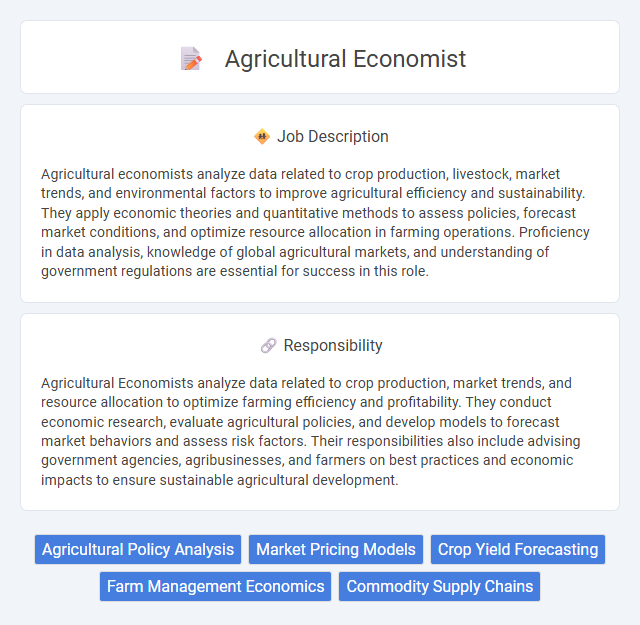
Agricultural economists analyze data related to crop production, livestock, market trends, and environmental factors to improve agricultural efficiency and sustainability. They apply economic theories and quantitative methods to assess policies, forecast market conditions, and optimize resource allocation in farming operations. Proficiency in data analysis, knowledge of global agricultural markets, and understanding of government regulations are essential for success in this role.
Individuals with a strong interest in economics and agriculture may find a career as an agricultural economist suitable, especially if they enjoy analyzing data and addressing challenges related to food production and resource management. Those who are comfortable working with both quantitative information and policy development might have a higher probability of success in this field. People who prefer hands-on farming tasks or less analytical roles could potentially find this job less aligned with their skills and interests.
Qualification
Agricultural economists typically require a bachelor's degree in agricultural economics, economics, or a related field, with many roles preferring a master's or doctoral degree to specialize in areas like resource management, agricultural policy, or commodity markets. Strong quantitative skills, including proficiency in statistical software such as STATA, SAS, or R, are essential for analyzing economic data and market trends. Experience in agribusiness, rural development, or environmental economics combined with excellent communication abilities enhances job prospects in government agencies, research institutions, and private sector firms.
Responsibility
Agricultural Economists analyze data related to crop production, market trends, and resource allocation to optimize farming efficiency and profitability. They conduct economic research, evaluate agricultural policies, and develop models to forecast market behaviors and assess risk factors. Their responsibilities also include advising government agencies, agribusinesses, and farmers on best practices and economic impacts to ensure sustainable agricultural development.
Benefit
An Agricultural Economist is likely to benefit from strong job stability due to the essential nature of agriculture in global economies. The role probably offers opportunities to influence policy decisions, improving food security and resource management. Salary prospects and career growth appear favorable, especially in governmental agencies, research institutions, and agribusiness firms.
Challenge
The job of an Agricultural Economist likely involves navigating complex challenges such as fluctuating market prices, climate change impacts, and evolving government policies that affect agricultural productivity and sustainability. There is a probability that they must analyze large datasets and predict economic outcomes to advise farmers, policymakers, and businesses effectively. This role may also demand balancing economic efficiency with environmental and social considerations to support resilient agricultural systems.
Career Advancement
Agricultural economists analyze data on agricultural markets, production, and policies to support decision-making in the farming sector. Career advancement opportunities include roles such as senior analyst, policy advisor, or research director within government agencies, private agribusiness firms, and international organizations. Gaining expertise in data analytics, econometrics, and sustainable agriculture enhances prospects for leadership positions and specialized consulting careers.
Key Terms
Agricultural Policy Analysis
Agricultural economists specializing in agricultural policy analysis evaluate the impact of government policies on farming practices, market prices, and rural development. They utilize statistical models and econometric tools to forecast outcomes of subsidies, tariffs, and trade regulations on crop production and food security. These professionals provide critical insights that guide policymakers in designing efficient, sustainable agricultural programs to enhance economic stability and resource management.
Market Pricing Models
Agricultural economists specializing in market pricing models analyze supply and demand data to forecast commodity prices and optimize resource allocation in the agricultural sector. They utilize econometric techniques and statistical software to interpret market trends, assess price volatility, and advise stakeholders on pricing strategies for crops, livestock, and agricultural inputs. Their insights help governments, agribusinesses, and farmers make informed decisions to enhance market efficiency and profitability.
Crop Yield Forecasting
Agricultural economists specializing in crop yield forecasting analyze historical data, climate models, and market trends to predict future agricultural outputs accurately. They use statistical tools and remote sensing technology to assess factors affecting crop production, such as weather patterns, soil quality, and pest outbreaks. Their forecasts support policymakers and farmers in decision-making processes to optimize resource allocation and maximize economic returns.
Farm Management Economics
Agricultural Economists specializing in Farm Management Economics analyze production efficiency, resource allocation, and financial decision-making on farms to optimize profitability and sustainability. They utilize economic models and data analysis to assess costs, yields, labor inputs, and market trends, guiding farmers in investment planning, risk management, and policy compliance. Expertise in farm-level economic strategies supports improved farm productivity, income stability, and long-term viability.
Commodity Supply Chains
Agricultural Economists specializing in commodity supply chains analyze market trends, production data, and trade flows to optimize the efficiency and stability of agricultural commodities such as grains, livestock, and produce. They develop models to forecast supply disruptions and assess the economic impact of policies, weather events, and global demand shifts on pricing and distribution networks. Expertise in supply chain management, trade regulations, and market risk analysis is essential for improving the resilience and profitability of agricultural commodity markets.
 kuljobs.com
kuljobs.com